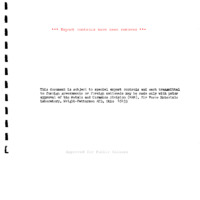-
Title
-
Corrosion Cracking of Metallic Materials
-
Date
-
1970
-
Index Abstract
-
Not Available
-
Photo Quality
-
Complete
-
Report Number
-
AFML TR 70-2
-
Corporate Author
-
Ohio State Univ Columbus Dept Of Metallurgical Engineering
-
Laboratory
-
Air Force Materials Laboratory
-
Extent
-
210
-
Identifier
-
AD0867061
-
Access Rights
-
Export Controls
-
Distribution Classification
-
1
-
Contract
-
F33615-69-C-1258
-
DoD Project
-
7312
-
DoD Task
-
731202
-
DTIC Record Exists
-
No
-
Distribution Change Authority Correspondence
-
USAFML LTR
-
Distribution Conflict
-
No
-
Abstract
-
Stress corrosion behavior of titanium alloys and high strength steels was studied. In titanium alloys the initiation and propagation of cracks in aqueous and methanolic environments is being studied as a function of alloy composition, electrochemical control, and applied stress. Corrosion processes within crevices are being studied. Straining electrode studies are also reported. Crack initiation in Ti-6Al-4V specimens was observed at alpha-beta interfaces and in beta grains. Studies of crack velocity show it to depend on applied stress but not on potential. Crevice studies show corrosion to be accelerated when the IR drop is large. In high strength steels the processes of transient passivity, dissolution of carbides, crack propagation and hydrogen permeation are being studied. The kinetics of transient passivity on iron alloy surfaces shows good agreement with classic models for growth of thin films. Dissolution of iron carbides is shown to depend on pH, potential and anion. The action of cathodic poisons such as arsenic is shown to depend on co-deposition of the poison species.
-
Report Availability
-
Full text available
-
Date Issued
-
1970-01
-
Provenance
-
Lockheed Martin Missiles & Fire Control
-
Type
-
report
-
Format
-
1 online resource
-
Creator
-
Fontana, Mars G.
 AFMLTR70-002.pdf
AFMLTR70-002.pdf